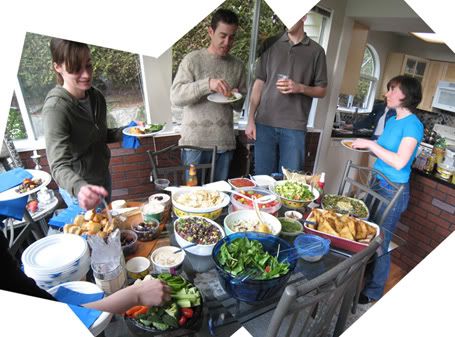|
|
30.04.07
We make so much more fuss about the (deciduous) leaves changing colours in the fall compared to the emergence of leaves in the spring; an anomaly for a youth-obsessed culture that abhors signs of aging and senescence. Perhaps the new growth lacks the drama, no tragedy en masse bathed in fire colours. Spring is a sneaky miracle, particularly here; the evergreens and lack of snow keep us green year-round, while snowdrops in January don’t cause too much of a stir. From there, the crocuses in February and camellias in March segue seamlessly into our cherry-blossom spring, the flowers distracting us from the budding of the trees. The bare branches we’ve grown accustomed to become dotted with chartreuse, the maples sending out minimalist mobiles of hanging flowers. The Indian plums and salmonberries green the wilder spaces. The oaks, cottonwoods, walnuts, poplars, and alders are, for one time a year, uniformly coloured, like trees in children’s drawings: yellow-green with new growth. And still the traffic zooms by, money is lost and made and lost again, and people pass, plugged into one electronic device or another. We ignore the transformation of our corner of the world, in spite of all our harm, into a place of birdsong, and rustling shade, and green, green, green.
27.04.07
I haven’t said anything about work for a while, mainly because everything’s going well. We’re chugging along fairly smoothly; this week we hit 20% of the collection digitized. This puts us well on pace to complete our part of the project on schedule. Construction noise has increased, with the crew jackhammering directly on the existing building, directly above the staff room. The effect is like being on the inside of a drum being played by a flock of enthusiastic giant woodpeckers. Luckily my work area remains less directly affected.
We take our breaks whenever it’s convenient for us, and so that we never overwhelm the staff room resources. A couple days ago, it happened that eight of us all sat down to eat at the table at the same time. “It’s like Sunday dinner”, said the head of our project. Twice this week, all twentysomething of us have congregated over sugary things to celebrate birthdays among the staff. We also socialize together outside of work hours (well, most of us). I don’t find this odd, having worked either utterly alone or with a group of co-workers who are also friends (a priori or a posteriori), but apparently it is. Perhaps it’s my particular fields of work which cause this skew, or the fact that none of us have our own offices, so everyone is forced to share space, or that we can’t eat where we work, so we all see each other in the staff room. Or maybe I’ve just been lucky enough to find groups of people who can get along (or pretend to) well enough that going to work means being among friends.
Now if only work wasn’t so far away…
22.04.07
In a process of botanical reverse-colonialism, we spent some time today ripping out invasive vines of English Ivy. Take that, ecological guilt! Happy Earth Day. More images here.

21.04.07
The Federal Government does it again. After being shamed out of their “Clean Air Act”, they change their minister, re-vamp their environmental policy, then come out with a document full of financial excuses of why they don’t want to commit to Kyoto. This document issued by the Minister for the Environment, not the Finance Minister. Shouldn’t we have an Environment Minister who will actually advocate for the environment?
Flaws in the calculations of the economic impacts have already been pointed out by the CBC (http://www.cbc.ca/news/background/realitycheck/sheppard/20070419.html). For instance, the government holds up the spectre of higher gas prices, but the reason behind this is a larger-than-normal and not-completely-necessary carbon tax slapped onto gas by the government itself. They’re saying “bad things will happen because we will create the bad things”. The flip side of the equation was left out as well; all the lost jobs were highlighted, with no regard for job creation in fields of alternative energy or other sectors which would benefit. The amount of carbon emissions needing to be cut also seems excessive, with no reason given for that number. What the Government has done is create a scenario in which everything bad that can happen does go bad, and no good comes of it.
This is also a case of throwing out the baby with the bath water. Yes, it will hurt to meet our Kyoto commitments on schedule. Partly this is due to so much stalling on the part of the Federal Government, but it is not an excuse not to try. You don’t soften the targets, you don’t make more excuses, you do the work right now and you get there regardless of the timeline.
The economy is an odd creature that gluts itself regardless of its long-term health. If we do nothing, the forests burn and the ocean rises, and then the government can spend money to fight the disasters and re-build, and the economy is happy because resources are consumed and people are employed. How do you factor in the cost of human life and suffering that this will create? How much will the extinction of untold numbers of species cost? Dear Federal Government, what is the cost of doing nothing?

The Costa Rica Chronicles are complete, in terms of text anyway. Photos? Who knows.

And here are some images from a work bbq last weekend.

15.04.07
I was watching one of the national morning shows, and they did a wrap-up of gas prices in the major metropolitan centers across the country. For some reason, they didn’t list Vancouver, choosing instead to put “North Vancouver”, which to anyone unfamiliar with the city, probably sounds close enough. South and East Van are part of Vancouver proper, North and West, not so much. The price they listed in North Van was around $1.12/L, which was within the range of the rest of the country, $1.02 in central Canada, and $1.14 in Halifax.
The problem is that of every gas station between here and work, which encompasses an entire cross section of Vancouver, no one was selling gas for less than $1.20, nor had they been all week. We know something’s wrong and other television stations have highlighted this, but why would a national news program choose to hide the price gauge? Who told them to do it? Do gas companies get to dictate what information is distributed to the audience? What interest do the major media have in pandering to big gas?
It’s sad that we understand Government’s complicit role, as they generate a disproportionate amount of tax money from the sale of gas versus other goods. Also governments have allowed gas companies to have them over a barrel in terms of controlling the economies of petroleum resource-dependent communities. It would be nice if a democratic government enforced fair product pricing, but we all understand greed.
So what now? We’ve all heard the ways to reduce consumption, and we do what we can as the city tries to keep up with growth in a system laid out without any thought to future public transportation needs. People have organized gas boycotts on certain days, creating ripples in the ocean. And all the while, gas companies post record profits as we guzzle away at a finite resource. We need clean alternate energies, an end to price gauging, and an end to subsidies to big gas. We know this, and still nothing is done. I’d fall back on the power of the populace as consumers and voters, but it hasn’t always worked in the past. I don’t know, perhaps the greening of political rhetoric (in a move that smacks of trend) will actually result in something. If not, there will be a rude wake-up call for the gas companies when something in their well-oiled money machine breaks.

While doing a bit of fact-checking for this entry, I came across an article on creativity, which posits the same ideas about the source and nature of creativity as I did earlier this month, and also uses a water metaphor, then a milk metaphor, and then other stuff. I'd be worried about plagarism, but we can chalk it up to covergent evolution from creative minds in agreement. It's at http://www.synthesiscreative.com/newsDetail.php?nid=15

More Chronicles, the end is in sight.
09.04.07
 Magnolia sargentiana
Magnolia sargentiana
07.04.07
What is the nature of creative energy? Is it finite? Rechargeable? Recyclable? Disposable? Is there an end to innovation, will there come a point when nothing is new?
Perhaps this is the neurotic worry of people who are asked to create; that there will be nothing left. That everything looks like everything else, particularly what you’ve already done and you’ve become the physical manifestation of a broken record.
I don’t particularly believe that this is true. If I did I’d be out looking for other professions. So it brings us back to that dreaded question: “Where do you get your ideas from?” Historically (and likely in contemporary times as well) some would argue “divine inspiration”, but this leads to a couple of things; first, what would happen if you then declared yourself an atheist? Would all sources of inspiration vaporize? Could you repent? Secondly, it leads to people sitting around (or standing on hilltops in thunderstorms with long metal poles) waiting for inspiration to strike. Personally, I have better things to do.
So of course there is only one answer: from that deep dark well inside our minds, the one that is never in the same place twice, and that some people have yet to find, and perhaps never will. And are all wells created equal? If we say no, then it goes back to the well maker, which brings us back to divine intervention. So I will propose that the attributes of the well are as mercurial as knowing how to draw from it; that the wells get deeper and wider with use, that we may start out drawing teaspoons before being able to pour out buckets. And the source of the water is the openness of the mind to new ideas and new ways of being. If we close our minds, dam the flow to thought and knowledge, the wells run dry.
Still, you can have all the water in the world and pour it into the sand. Me? I’d rather grow a garden.

More Chronicles for you, I'd better get these done eh?
|
|
©d.tan  |








